ORIGINS
NAME INDEX
FAMILY HISTORIES
FAQS
COAT OF ARMS
NEWSLETTER
MESSAGE BOARD
HONOR ROLE
LINKS
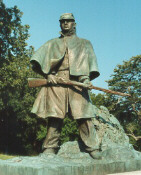
American Civil War 1861-1865
The Civil War is sometimes called the War Between the States or the War of the Rebellion or the War for Southern Independence. The chief and immediate cause of the war was slavery and the election of Abraham Lincoln in 1860. Lincoln was a leading advocate for the abolition of slavery which threatened the economy of the southern states. By the time he took office on March 4, 1861, seven southern states had already seceded from the union. The war began on April 12, 1861 when the south opened fire on Fort Sumter in Charleston Harbor, South Carolina. In July 1863 Union forces won two decisive battles in a matter of a few days that virtually changed the complexion of the Civil War. The battles of Gettysburg and Vicksburg assured Union victory in American's bloodiest conflict since its inception over 200 years ago. The war ended on May 26, 1865 when the last Confederate army surrendered. It took more than 600,000 lives including President Lincoln's, destroyed property valued at $5 billion and brought freedom to 4 million black slaves. The statistics below show the impact of the war in combatant lives.
|
Army |
Mobilized |
Fatalities |
% |
|
Union |
2,750,000 |
360,222 |
13 |
|
Confederate |
1,250,000 |
258,000 |
21 |
|
Total |
4,000,000 |
618,222 |
15 |
Of the 618,222 deaths during the war, 67 percent were from disease. What follows is the story of one of our ancestors who made the supreme sacrifice during this conflict.
Francis Harkness (1814-1863)
Francis Harkness was born in Scotland around 1814 and immigrated to northeastern Ontario. On February 23, 1843 he married Christiana Coulthart at the Presbyterian Church in Osnabruck, Ontario. Christiana had immigrated from Cummertrees, Scotland to North Lunenburg, Ontario with her parents and 13 siblings between 1824-1827. Around 1848 Francis and Christiana moved to Rutland/Middelbury, Vermont where several of their children were born. While living in Vermont, Francis was an overseer of the construction of the first railroad built through the state.
About 1850, the family moved to Packwaukee, Wisconsin probably drawn to the logging area because they had heard of it from others in the lumber industry in Vermont. Within a few years they moved northwest to Portage County and eventually settled permanently about 20 miles west in Wood County. In 1856 Francis purchased 57 acres in section nineteen of Rudolph Township near the town of Wisconsin Rapids for $72.54 from the public domain. He was the first person to ever own this plot of land. As one of the earliest settlers in the area, Francis organized the petition drive in 1856 that established the township. By 1861 the family consisted of Francis and Christiana and their nine children: Mary (1843-1869), Jane (1848-1924), Francis (1849-1922), Margaret (1851-1923), William (1853-1869), Christiana (1855-1926), Emeline (1856-1873), Henrietta (1858-1880) and Ellen (1861-1862).
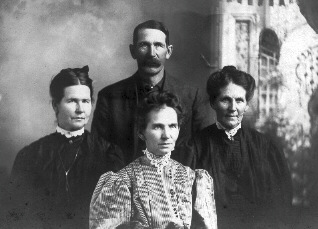
The adult children of Francis Harkness and Christiana Coulthart. Left to right: Jane (aka Jennie), Christiana (aka Annie) and Maggie with Francis (aka Frank) in the back.
On September 23, 1861 at age 47, Francis enlisted in Company G of the Twelfth Wisconsin Infantry. It is hard to say why he enlisted especially with a wife and nine children, six under the age of ten and one less than a year old. He must have felt a strong obligation since many in Wood County were opposed to the war, the county having a hard time obtaining enough men to form a company. The 12th Wisconsin Infantry was organized at Camp Randall in Madison from October to December 13, 1861. They left camp on January 11, 1862 for Ft. Leavenworth, Kansas where they were to spend the rest of the winter and spring. The trip was made during the coldest time of the year. At times the temperature dipped to twenty degrees below zero and the men had no tents for shelter. They marched to an area just south of Quincy, Illinois where they crossed the Mississippi to Hannibal, Missouri. From there they rode in open boxcars to Weston, Missouri. During the trip the men suffered immeasurably, even their rations froze. While on duty in various locations in Kansas, Francis became sick and spent some time in March and April 1862 at the hospital in Lawrence.
After four months in Kansas, their original mission, the Southwest Expedition, was cancelled and they received orders to embark for Tennessee. They sailed down the Missouri River by steamer to Columbus, Kentucky where they arrived on June 2nd. While in Columbus they repaired the railroad and rebuilt bridges that had been destroyed by the Rebels. Afterward they departed for Humboldt, Tennessee where they would remain from June 9th through October 1, 1862 to guard the rail lines. They then joined General Ulysses S. Grant's Central Mississippi Campaign. The winter of 1862/63 was spent in various locations in southwestern Tennessee on guard duty including guarding the Memphis to Charleston road near Memphis. In November and December 1862 Francis again became sick and spent time at the hospital in LaGrange. During their stay in Tennessee, the 12th engaged in several battles with the Confederate Army in northern Mississippi: Hernando on April 18, 1863 and Coldwater on April 19, 1863.
Meanwhile, in December 1862 Grant began to gather troops for a campaign directed at opening the Mississippi River to the Union and dividing the Confederacy in two. The key to the Confederate defenses was Vicksburg, the heavily fortified Mississippi city that commanded the river from its high bluffs. From January through March 1863, four attempts were made to bypass Vicksburg by cutting canals or changing the course of rivers. All failed. In April Grant prepared to put his final plan into operation. He would march his army of 44,000 down the west side of the Mississippi River to a point below Vicksburg, cross the river at Grand Gulf, march into Mississippi and attack the stronghold from the east. On May 7, 1863 his plan was put into action. After two assaults on Vicksburg in which he lost heavily, Grant decided the city would have to be starved out.
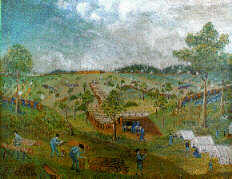
Painting of the Siege of Vicksburg by an unknown artist.
The 12th Regiment left the Memphis area on May 11th and arrived at Grand Gulf, on the 18th. They remained there until June 9th when they moved to Vicksburg and served in the trenches from June 11th until its surrender. Towards the end of the siege, Francis wrote the following letter home.
Vicksburg 29th June/63
Dear Family
I should have wrote to you yesterday but had to be on picket guard and had not time. We have to stand guard a good deal, as we want to keep Mr. Tecesh (William Tecumseh Sherman) in Vicksburg until he can stay no longer for hunger. Every few days we have news from them by deserters. They say they have not enough to eat. They say they are living on very short rations but they do not look as if they were hungry, the few that come within our lines. But we think they can not hold out much longer. When we first came here a great many took sick but they are coming back out of the hospital every day so that our companies will soon be pretty full again. Two or three have died since we came here out of our regiment.
We had orders yesterday on guard not to shoot unless we saw somebody to shoot at. But I did not see a man. We are about 5 hundred yards apart and if one on either side should set up his head he is in great danger. By some means, two mules got outside their pickets yesterday. The boys shot them down in short time. Nothing can show its head and live. One continual shower of shot and shell. And what think you. I had quite a sound sleep. So you see we have already learned to take it cool. We have taken Fort, they call (it) Fort Beaurigard. We undermined it and blowed it up. It is 6 miles from here but I think it is true I shot 15 rounds of cartridge yesterday but I do not think I hurt anybody. Altho I made quite a dust where their heads should have been and they in return just came as near me. We are sure we are much stronger than they in force are. It is ??(proving) we can not take the whole of them.
And they invite us to come to them by waving their hats and guns at us. The pickets are so near each other in some places that they can call to each other. Such as, Rebel come and we will give you some coffee. Go to h l (hell) with your coffee Mr. Yank. I expect a letter today so I will finish this next night as I will not be on guard till tomorrow likely. How is Jane, I would like to know. It will be a week today since I had a letter. 30th June - The mail came last night but no letter. We expect to get two months pay in a few days. We very seldom hear any news from the northern papers. By this time you will have seen Mr. Gibbs and Mosher. I will send you some money by some means so soon as we get paid. I have just had breakfast. We had coffee, sugar. We get baked bread 3 days out of 5 and crackers 2 days. We had some nice fresh beef yesterday and this morning.
I think you must ??? (not have written) or perhaps you could not get it to the post office. Tell (me) how you are often and all the news in town. I thought Mary would have sent me William Gardner's address. I have wrote twice for it. If I knew the number of his regiment I would go and see him. Why do you not tell me if you can. If you can not, you say so. Phil is better. The captain told me to go on guard just when I felt able. He was kind when I was sick. Try and write me a letter with those new pens, I am. And Frank can you mow well this year. Frank I wish you had a good scythe.
Your affectionate husband and father
F. Harkness
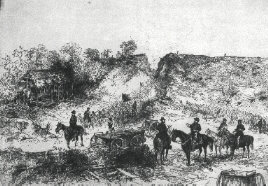
Drawing of Union troops entering Vicksburg.
During the siege of Vicksburg the defenders and civilians were forced into near starvation. One Rebel soldier reported "rats, which are very numerous in our camps, are considered a dainty dish and are being considerably sought after". The city surrendered after six weeks on July 4, 1863. After 47 days Vicksburg had fallen. It was the longest siege in American military history and marked the beginning of the end for the Confederacy. Around 30,000 Confederate soldiers surrendered to the Union forces. According to one estimate, there were a total of 19,000 casualties on both sides, 10,142 Union and 9,091 Confederate. The victory was even more important than Gettysburg, for it gave the Union complete control of the Mississippi River. The Confederacy had been cut in half. "Grant is my man," declared President Lincoln. He than gave Grant command of all the Union armies.
After Vicksburg fell, the 12th advanced to Jackson and from July 10-17 was involved with the siege of Jackson after which they returned to Vicksburg. Francis died of dysentery on August 6, 1863 at Reytl Hospital in Vicksburg. He had contacted said disease while in the line of duty at the siege of Vicksburg. Francis was later buried in section "I" grave 8018 at Vicksburg National Cemetery. Soldiers who succumbed to wounds or disease were usually buried close to where they died and their grave was often marked by etching their name onto a wooden board. When the Vicksburg National Cemetery was established, efforts were made to locate the remains of Union Soldiers throughout the South and move them to Vicksburg for reinterment. Unfortunately, by that time, many of the wooden markers were gone. Some estimate the casualties at Vicksburg were as high as 35,825.
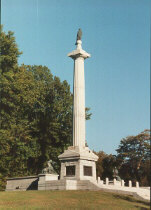
The Wisconsin Memorial at Vicksburg National Cemetery which contains the names of 9,075 Wisconsin troops who fought at Vicksburg. The memorial includes the bronze statue of a Union soldier as seen in the next paragraph.
On June 6, 1864, the clothing and personal effects of Francis Harkness and $22 were sent to his wife by the Union Army. During the approximate two years he had been in service, the 12th became know as "The Marching 12th" because they had marched over 2,000 miles by foot. Of the 2,186 who served in the 12th Regiment from 1862 until it was relieved in 1865, 294 men died. 30 percent were killed or mortally wounded in action and 70 percent died of disease. The long journey from Wisconsin during the dead of winter, the months on the plains in Kansas, the march through the swamps and bayous of Louisiana and Mississippi and four weeks in the trenches at Vicksburg had taken its toll.
Shortly after his death, his wife Christiana Harkness filed for a pension and received $8 a month plus an additional $2 a month for each child she had under the age of 16. It was barely enough in which to survive. In 1867, five years after Francis died, John Sidenham Coulthart left his father's farm in Waseca County Minnesota and moved to Wisconsin Rapids. Most likely he was sent by his father to help his Aunt Christiana Harkness. By 1867 Christiana was surely having difficulty running the family farm by herself. At the time she had nine children between the ages of 9-24, the oldest son being only 18 when John arrived. John must have been quite a help for her. Within two years in 1869, John helped his aunt bury two of his cousins. By 1870 the Harkness farm of 200 acres had a real estate value of $1000 and included personal property valued at $250. The farm animals consisted of 1 horse, 2 cows and 10 sheep. During the year the farm produced 50 bushels of rye, 300 bushels of oats, 8 bushels of peas, 5 bushels of hay and 125 pounds of butter. John buried another cousin in 1873 and his aunt finally succumbed in late September of 1876 at the rather young age of 58.
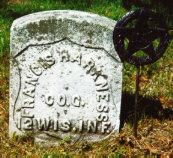
The Francis Harkness grave at Forest Hill Cemetery in Wisconsin Rapids, Wisconsin placed on the site at a later date.
Four of the Harkness children survived their parents. Jennie Harkness married her cousin William Nathaniel Hunter in 1873 and Frank Harkness married his cousin Barbara Jean Hunter in 1874. Both couples moved to Dakota County Minnesota where the Hunters lived. Christiana Harkness married Llewellyn Garrison in 1874 and they remained in Wisconsin Rapids as did her sister Margaret Harkness who married Edgar Warner in 1878.
Bibliography
- 1870 Federal Census - Rudolph Township, Wood County Wisconsin
- 1880 Federal Census - Sigel Township, Wood County, Wisconsin
- The American Heritage New History of the Civil War by Bruce Catton
- Civil War Casualty information from civilwarhome.com/casualties.htm
- Copy of letter originally written in 1863 by Francis Harkness in possession of Cindy Terpstra
- Genealogical information from Cindy Terpstra
- History of the Twelfth Wisconsin Infantry Volunteers at www.agro.agri.umn.edu/~lemedg/12thwis/12thhist.htm
- History of Wood County by George Jones
- Microsoft Encarta Encylopedia
- National Archives - Washington, DC. Military and Pension records for Francis Harkness
- Personal visit to Forest Hill Cemetery in Wisconsin Rapids, WI
- Register of Land Certificates - June 15, 1855, Sept 1, 1956, Wood County Wisconsin
- United States to Francis Harkness Land Patent - Sept. 7, 1857, Wood County Wisconsin
- Vicksburg National Cemetery Website at http://pigpen.itd.nps.gov/vick/natcem/hap_haz.htm. Francis is listed incorrectly under Francis Harnkess
- Wisconsin Veterans Museum at badger.state.wi.us/agencies/dva/museum/cwregts/12wisinf.html
Visit the following pages for additional information on Francis' Coulthart ancestors and relatives:
- Clan Coulthart a quarterly newsletter
- The official Coulthart Family Tree created by Tim Coulthart
- For information about the First North Amercian Coulthart Family Reunion
- Coming soon. Take a trip to Cummertrees Scotland where the Coulthart Family originated.
- Coming soon. Take a trip to Eastern Ontario where the Coulthart Family originally settled.
- Coming soon. Take a trip to South Central Minnesota where some Coulthart descendants moved.

